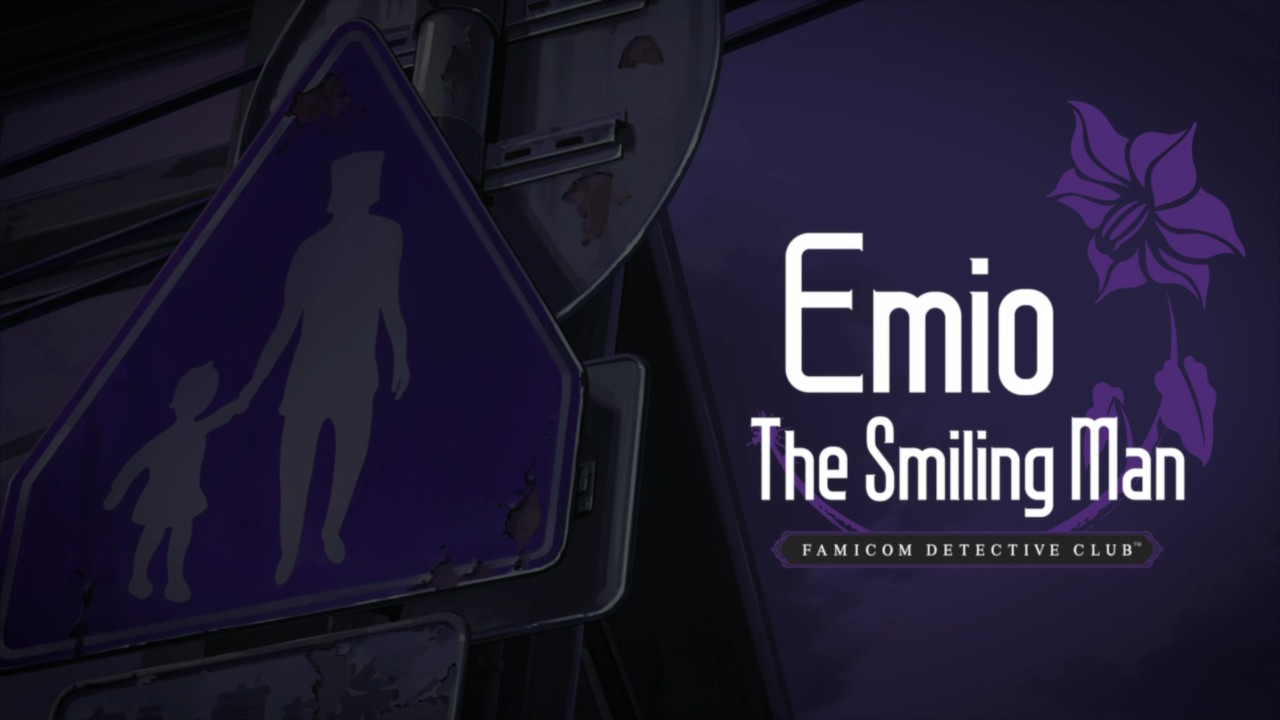TechRadar Verdict
Emio - The Smiling Man: Famicom Detective Club might not reinvent the visual novel genre, but it still offers a fantastic mystery elevated by brilliant writing, a memorable cast of characters, some truly excellent visuals, and a phenomenal final chapter.
Pros
- +
Beautiful art direction
- +
Engaging mystery narrative
- +
Memorable and charming characters
- +
Incredible ending
Cons
- -
Lacks touchscreen support
Why you can trust TechRadar
Platform reviewed: Nintendo Switch
Available on: Nintendo Switch
Release date: August 29, 2024
As the first new entry in the Famicom Detective Club visual novel (VN) series in almost 30 years, Emio - The Smiling Man: Famicom Detective Club is nothing short of a triumph and easily one of the best Nintendo Switch games right now. Building on the strong foundations laid by the underappreciated remakes of the first two games, The Missing Heir and The Girl Who Stands Behind, released back in 2021, Emio - The Smiling Man is a wonderful example of how you can successfully modernize a franchise while staying true to its roots.
Ostensibly, not much has changed since the remakes. You still play as the same young detective, though now as a 19-year-old rather than a young teenager, who is tasked with solving a sinister, almost supernatural case. You interact with the world through a series of prompts found on a small command menu, such as “Call/Engage”, “Ask/Listen”, “Look/Examine”, and “Think”.
It’s a very old-fashioned way to interact with the medium, unfolding much more like a traditional choose-your-own-adventure novel than the mechanics of other investigative VN franchises like Ace Attorney or Danganronpa. It certainly takes a little bit of getting used to at first, but is an incredibly rewarding system once you get the hang of it. Each scene is effectively a little puzzle, requiring the right combination of commands to progress.
This is perfectly encapsulated in one memorable moment where our hero arrives outside a bar. The player can hear screams coming inside. The absence of the usual “Travel” option, which would normally allow you to open the door and go in, is your cue to hit “Ask/Listen” so the protagonist can notice the sound and proceed with the appropriate level of urgency.
Chasing the bag
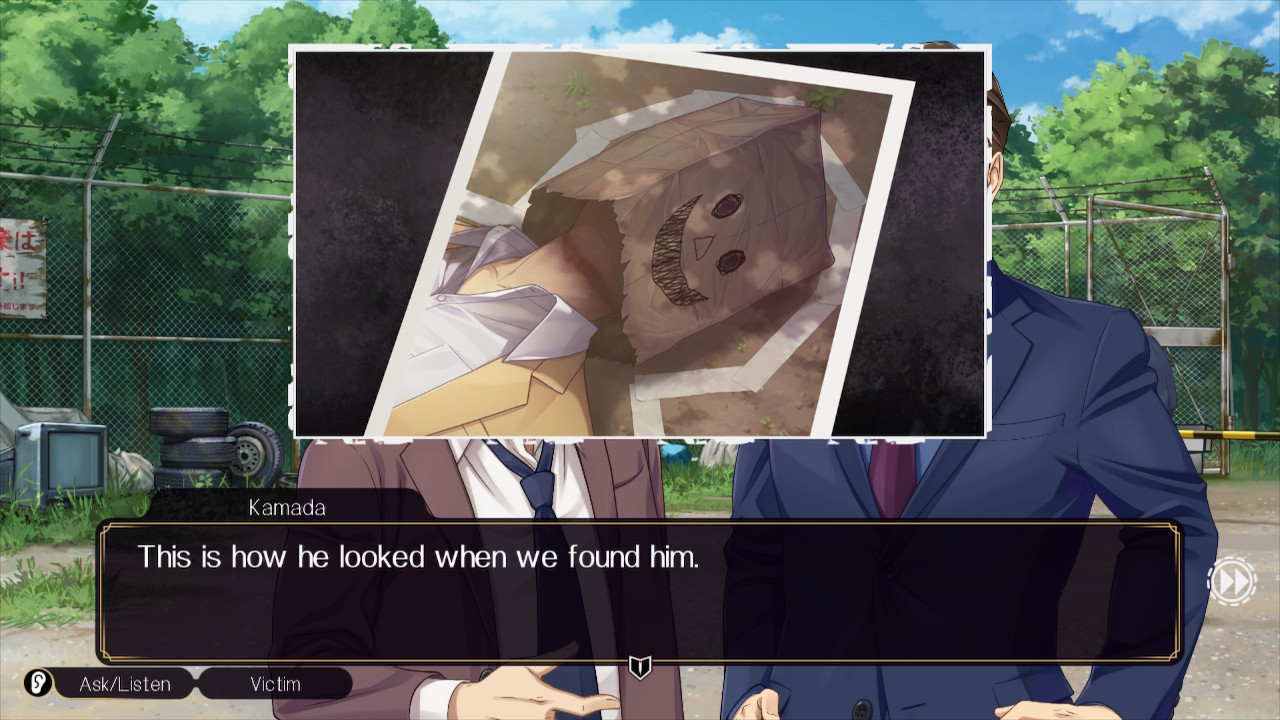
The underlying systems may not have changed hugely, but Emio - The Smiling Man is both considerably more intuitive and more engaging than the remakes of its predecessors. As much as I enjoyed The Missing Heir and The Girl Who Stands Behind, anybody who has played those games will know that they proceed at a frankly glacial pace. This is especially true of the first few hours, which can honestly be a little painful to sit through. Of course, this is the almost inevitable result of their age, having originally launched in 1988 and 1989 respectively for the Famicom.
Still, I was delighted to find that Emio - The Smiling Man opens with a bang and maintains that momentum for its entire runtime. The narrative begins with a schoolboy found dead, seemingly strangled, and with a creepy, smiley-faced paper bag placed on his head. It soon becomes apparent that this case is inextricably linked to the urban legend of Emio, a paper-bag-wearing killer thought to target crying schoolgirls, and a series of similar unsolved killings from 18 years ago.
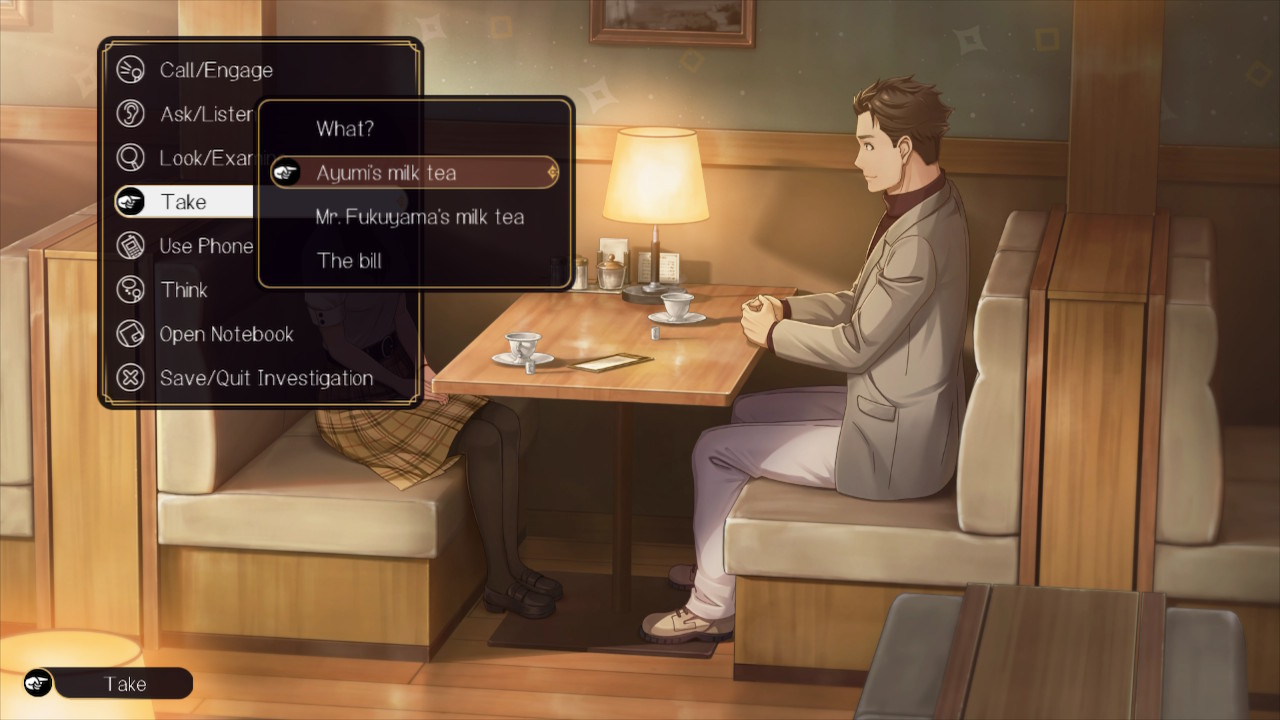
You are joined in your investigation by Ayumi Tachibana, another employee at your detective agency, and occasionally switch over to her perspective for a fresh look at events. This provides a refreshing change of pace and it’s surprisingly interesting to just observe the differences in how certain characters interact with the Tachibana compared to the protagonist. There is also a wide cast of supporting characters, each masterfully written with complex, varied motivations.
Sign up for breaking news, reviews, opinion, top tech deals, and more.
The subject matter of this installment is considerably darker than that of the remakes, with its fair share of grim reveals and disturbing moments. The plot is littered with red herrings and does a formidable job maintaining the suspense until it all culminates in a brilliant, dramatic conclusion that resolves almost all of the narrative’s biggest mysteries in one fell swoop. The end credits are then followed by a truly delightful surprise that immediately had me diving back in for more.
Out and about

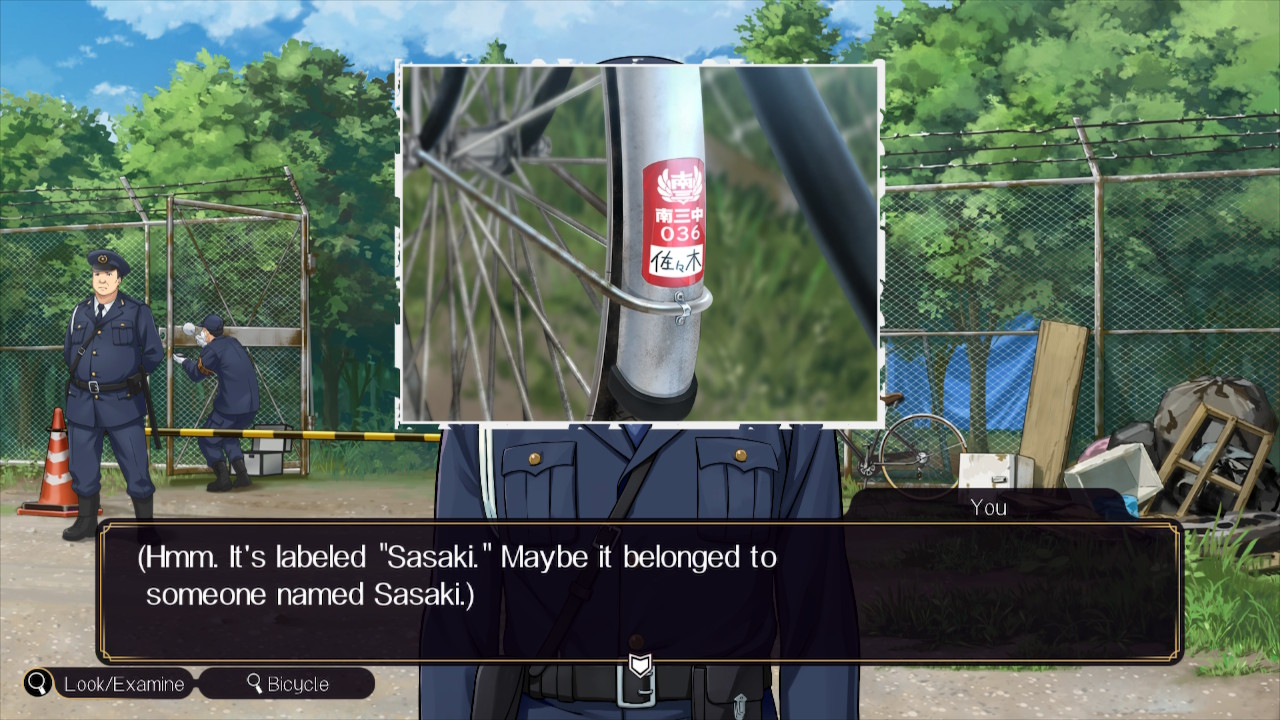
Unlike many other visual novel games, the entire script of Emio - The Smiling Man is accompanied by full Japanese-language voice acting that truly helps the experience feel cinematic.
The overall tone may be quite bleak, but there are still plenty of amusing moments that stop things from ever becoming too oppressively miserable. Many of these are contained in easily-missable interactions, which reward you for experimenting with all of the tools at your disposal. I got a good chuckle the first time I called Tachibana on the in-game phone in the middle of a face-to-face conversation, for example, which prompted a suitably baffled reaction.
Despite this, the entire story is wholly linear which might disappoint those who prefer more exploration in their detective games. You’re occasionally asked to put your own investigative skills to the test by answering questions though, either by selecting preset options or inputting your own response with an on-screen keyboard. It’s nothing groundbreaking, but does add a pleasant extra layer of interactivity.
It also helps that background and character art are simply phenomenal across the board, with a wide variety of truly beautiful locations to pore over. Character sprites are well animated, while backgrounds are filled with moving details that really bring them to life. From the gentle swaying of trees in a light summer breeze to the passing buildings as you drive down a busy road, everything is just dripping with quality and polish.
My one complaint, bar the slightly repetitive background music, is the noticeable lack of any touchscreen support. Playing in handheld mode, these scenes are practically begging to be explored through the “Look/Examine” function. Dragging the on-screen cursor around with the thumbsticks works, but this really seems like a missed opportunity to channel some of that nostalgic Nintendo DS adventure game magic.
For this to be my only issue really goes to show what a brilliant experience it is. Whether you’re a visual novel veteran or someone new to the genre looking for an engaging, high-quality introduction, Emio - The Smiling Man: Famicom Detective Club simply cannot be missed.
Accessibility
Sadly, there are no dedicated accessibility features in Emio – The Smiling Man: Famicom Detective Club. The settings menu does offer the ability to change the speed with which text is displayed, which may be useful to those with slower or faster reading speeds.
Should I play Emio – The Smiling Man: Famicom Detective Club?
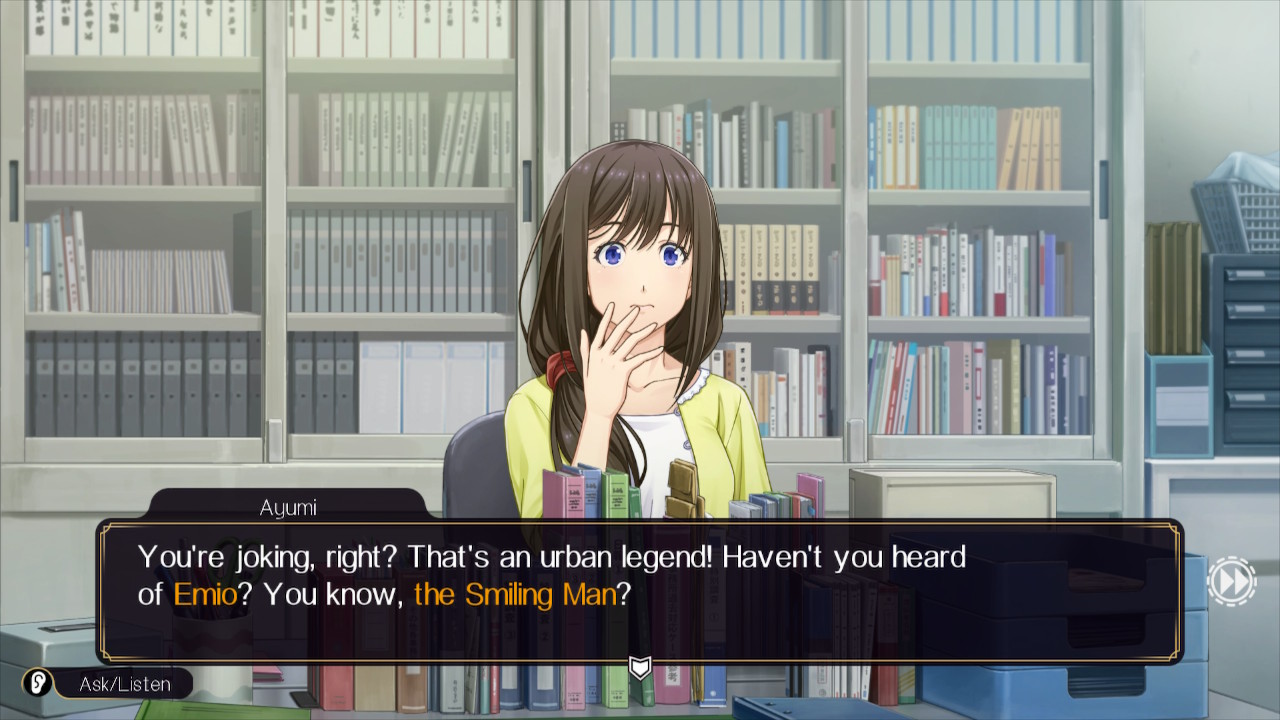
Play it if…
You love a good mystery
Emio - The Smiling Man: Famicom Detective Club presents a gripping mystery full of all the twists, turns, and red herrings needed to keep you thoroughly entertained until the credits roll.
You’re new to visual novels
It’s definitely old-fashioned in a mechanical sense, but the strength of the writing means that Emio - The Smiling Man: Famicom Detective Club is a great introduction to the visual novel genre.
Don’t play it if…
You enjoy more open detective games
Emio - The Smiling Man: Famicom Detective Club is entirely linear. If you prefer more freedom in your detective games, then consider something like Sherlock Holmes Chapter One or Disco Elysium instead.
How we reviewed Emio – The Smiling Man: Famicom Detective Club
I played Emio - The Smiling Man: Famicom Detective Club for just over 14 hours. In that time I completed the entire main story and went back to the beginning to start a second playthrough. Throughout my time with the game, I played on a Nintendo Switch OLED console in both handheld and docked mode. In docked mode, I made use of a Nintendo Switch Pro Controller. For audio, I relied on my trusty pair of Final VR3000 earbuds for a seriously immersive time.
While I was playing, I compared my experience to that in other visual novels such as the entire Ace Attorney series, The House in Fata Morgana, Harmony: The Fall of Reverie, Needy Streamer Overload, and more. I also evaluated how it stacks up against other detective games, such as the Sherlock Holmes games from developer Frogwares, Disco Elysium, and Paradise Killer among others.
First reviewed August 2024.

Dash is an experienced tech journalist who currently serves as the Gaming Editor at TechRadar, where he helps oversee coverage of video games and related products.
Before joining the team, he was Contributing Writer at PLAY (formerly Official PlayStation Magazine) and has also written articles for many of the UK's biggest gaming magazines including Edge, PC Gamer, and SFX.
Now, when he's not getting his greasy little mitts on the newest hardware or gaming gadget, he can be found listening to J-pop or feverishly devouring the latest Nintendo Switch otome.
